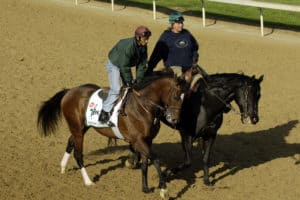Latest News – The Horse
Michigan Man Charged in Horse Killings
A Michigan man is charged with killing two horses, one of them his own, according to Ottawa County law enforcement authorities. The man suspected his wife and her horse’s trainer were engaged in an extramarital affair. Ottawa County sheriff’s department Lt. Mark Bennett said Dennis Finkler and his wife were at the stable where they boarded their 12-year-old Quarter Horse on Feb. 11 when they
Oregon Authorities Seek Horse Owner
Law enforcement authorities in Oregon are seeking the owner of a horse found wandering in the Tumalo Reservoir area between the towns of Bend and Sisters last week. Deschutes County sheriff’s deputies discovered the approximately 8- to 10-year-old gray Arabian gelding on Feb. 11 after a caller reported seeing it unattended in the area.
2011 Veterinary Regenerative Medicine Conference to be Held in Kentucky
The North American Veterinary Regenerative Medicine Association (NAVRMA) announced Feb. 7 that online registration is open for the 2nd annual North American Veterinary Regenerative Medicine Conference (NAVRMC) to be held June 2-4, 2011, in Lexington, Ky. Rood & Riddle Equine Hospital will act as the conference organizing host in collaboration with the University of California, Davis (UC Davis)
Readers Discuss Equine Quarantine Practices
More than 520 readers of TheHorse.com responded to a poll asking, “Do you quarantine horses upon return from being off the farm (e.g., vet clinic, horse shows, etc.) and in contact with other horses?”
Subfertile Breeding Stallions: Management Strategies (AAEP 2010)
“Stallions do not become sires because of reproductive capability,” began Dickson Varner, DVM, MS, Dipl. ACT, professor of large animal medicine and surgery at Texas A&M University. “They’re selected based on performance, pedigree, and conformation–reproductive ability is last. The equine breeding industry abounds with stallions whose level of fertility is less than optimal.” Varner discussed
Dealing with Boredom
When the weather’s frightful and our horses end up snowbound in their stalls, who gets antsier, us or them? I know I get pretty cranky when

Racehorse Health (AAEP 2010)
Dr. Tom Brokken discusses bone lesions, track surfaces, the racing industry’s commitment to making racing safer, and more topics from the racehorse session at the 2010 American Association of Equine Practitioners convention.
West Virginia Man Faces Cruelty Charges
A West Virginia man is facing multiple animal cruelty charges in connection with the alleged maltreatment of horses on his Greenbrier County farm. Greenbrier County Sheriff’s Department Chief Deputy Kirby Hanson said that last week after responding to a tip about a downed horse, law enforcement officers discovered more than 30 horse carcasses on a 300-acre farm belonging to Grady Whitlock.
Providing Nutritional Support for the Equine Skeletal System
Throughout a horse’s life, bone adapts and changes continually in relationship to its environment. Osteochondrosis (OCD) is the failure of the bone to develop strong cross-linkage of collagen fibers (which affects the cartilage) and is most commonly caused by poor nutrition, mechanical trauma, and rapid growth, with nutrition being the most important. Lesions caused by OCD can result in serious
Two Horses Die at Newbury Racecourse; Electrocution Suspected
Two horses collapsed and died in the paddock on Feb. 12 at the Newbury Racecourse in Berkshire, England, according to a report from BloodHorse.com. An investigation into the cause of the horses’ deaths is under way, but initial reports indicate that the horses might have been electrocuted.
TheHorse.com Receives Post-WEG Alltech ‘A+’ Award
Alltech, American Horse Publications (AHP), and the International Alliance of Equestrian Journalists (IAEJ) are delighted to announce the recipients of the Alltech ‘A+’ Award, established to honor creativity, passion, and excellence in equine journalism with stories connected to the Alltech FEI World Equestrian Games. The post-Games media contest, judging entries published between July 2, 2010,
Reward Offered for Information about Mustang Shooting
The Bureau of Land Management (BLM) is offering a $10,000 reward for information leading to the arrest and conviction of whoever is responsible for shooting a wild horse in Nevada. On Feb. 9 an on-site veterinarian conducting health assessments during the agency’s Elko District’s Antelope Complex wild horse gather discovered a mare that had sustained what appeared to be a puncture wound to her
Catastrophic Ocular Surface Failure in the Horse (AAEP 2010)
The soft, expressive equine eye holds a great fascination for horse lovers. And although it’s normally a resilient structure, it’s not immune from injury. At the 2010 American Association of Equine Practitioners Convention, held Dec. 4-8 in Baltimore, Md., Dennis Brooks, DVM, PhD, Dipl. ACVO, a professor of ophthalmology at of the University of Florida’s College of Veterinary Medicine gave this
New Surgical Tool for Treating Epiglottic Entrapments in Standing Horses
An epiglottic entrapment is an upper airway abnormality that can cause poor performance in athletic horses. A team of researchers from the University of Montreal recently developed a safer instrument for surgically correcting an entrapped epiglottis. When a horse swallows food or water, the epiglottis (a movable, leaf-shaped piece of cartilage located at the base of the tongue and above the
Alltech’s Annual Symposium Changes the Game in 2011
Whether in sports competition or the game of life, there are turning points that elevate the underdog to victory, redefining the anonymous as the unforgettable. In the face of mounting challenges, how does one identify and seize these pivotal moments to create a catalyst for success? In Lexington, Ky., from May 22-25, Alltech’s 27th Annual International Animal Health and Nutrition Symposium will
Treating Guttural Pouches in Foals: An Easier Way (AAEP 2010)
Instead of operating on a foal with guttural pouch tympany, veterinarians should consider placing a flexible tube through the opening of his guttural pouch(es) via the nasal passage, according to a veterinarian from Auburn University.











